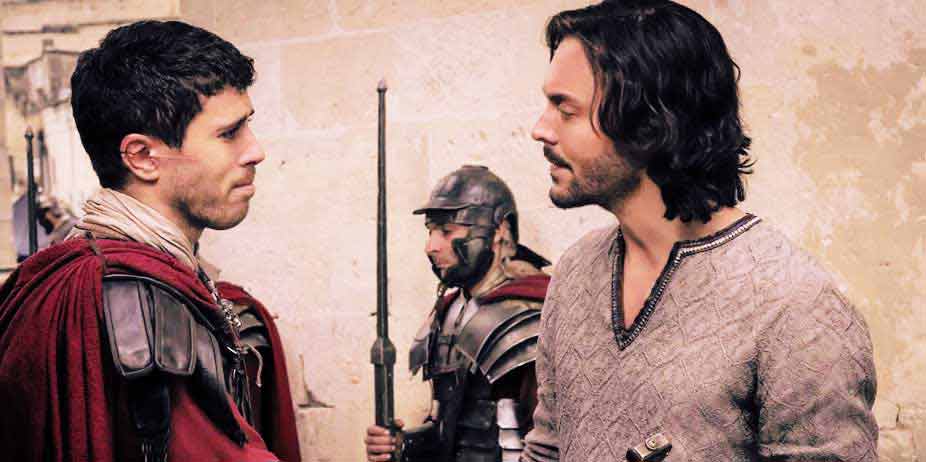
Ben-Hur (2016)
A new adaptation of Lew Wallace's epic novel, Ben-Hur is a gut-wrenching visual spectacle with powerful themes of redemption and forgiveness.
Excitement fills the arena. Horses strain. Chariot drivers exchange menacing looks. Judah Ben-Hur (Jack Huston) and Messala (Toby Kebbell) exchange threats. The gates open. They charge into the arena, to the screams of a bloodthirsty crowd...
Eight years earlier, Judah and Messala are closer than brothers. Messala has lived with the Hur family from childhood, since his father's disgrace. Haunted by the "shame" of his name, he decides his destiny lies with Rome. Hoping to win enough recognition and fortune to marry Judah's sister, Messala joins the army and goes off to fight. For three years, the Hurs hear nothing of him. Judah marries the servant girl, Esther (Nazanin Boniadi). He also meets a strangely charismatic carpenter (Rodrigo Santoro) whose message of love and forgiveness contrasts with the violence of Jerusalem under Roman occupation. Then, one day, Judah is summoned to the garrison. Messala has returned home. The arrival of Pontius Pilate (Pilou Asbæk) in the city sends both men down different paths, and Judah on a quest for vengeance that comes to its climax in a bloody arena.
This film has taken a beating in the press for daring to "remake" the 1959 award-winning classic; but it's a solid piece of entertainment, and arguably, has far more powerful spiritual themes than any of its predecessors. The cast is terrific, the script never lags, the romance is believable, and the sense of realism in Jerusalem is wonderful. This film explores the political upheaval of the region at the time, using the zealot conflicts as a cornerstone for the event that lands Judah in trouble with Rome. Jesus makes numerous appearances throughout, showing a vivid contrast between His message of hope, peace, and love and the common violence of the day, both between the Romans and the Judeans. (He intervenes at one point to prevent Jews from stoning a man to death. Pilate, sensing his charisma, utters the profound belief that this man is "more dangerous than any of the zealots.") The story focuses so much on Judah that Jesus shifts into the background; and it anticipates the audience knowing the reasons for Jesus' crucifixion and His resurrection (the latter isn't shown). Esther is also a follower of Christ, early on intrigued by His words, and later present among those with Him in the Garden. Forgiveness is the underlining theme and the story rewards the audience with a happy ending.
While I do have a few minor nitpicks with the production's historical accuracy (it's a bit shocking to see so many beards among the Romans), the costuming and set design is magnificent. The chariot race isn't the only pulse-pounding moment in the film, but it does boast spectacular action scenes (and some gritty carnage). The camera is used to give a sense of claustrophobia inside the ship. The score neither overwhelms nor detracts from the experience. I wanted a bit more duality in the Roman characters than the script allowed; most of them are simply villains. The audience is left to assume Messala's emotions and motivations, and he doesn't seem to have as much emotional conflict as one would expect, in condemning his former family to death. It is confusing toward the start, as it establishes the zealots, but resolves all its major plot arcs.
Sentimentality for the older film may make people consider passing this up, but if they can put aside comparisons and see it as a new take on the novel, rather than a remake, they'll find it a thought-provoking and powerful film that expresses Christ's redeeming message of transforming love and the healing power of forgiveness.
Sexual Content:
A soldier tells another soldier a woman "wants" him; and
others at the table laugh. The soldier speaks to her, then says, as an insult,
she "asked for too much money" (prostitution).
Language:
Judah says "my God" several times as an exclamation.
Violence:
Lots of action scenes. Men are skewered with swords and
arrows. References to crucifixion. Men are beaten on a galley ship; one is
murdered (off-screen); the ships engage in battle, with lots of warfare (a
screaming man is tied to one ship, and we see a gush of bloody water when he
hits); tons of horses are killed in the chariot race, along with upended
chariots, including several men being run over / battered; one hangs onto
Judah's chariot for awhile, before he's run over; Judah witnesses Jesus hanging
on the cross; some fist-fights; Pilate orders twenty people chosen at random for
execution.
Other:
A Roman references having "many gods."
